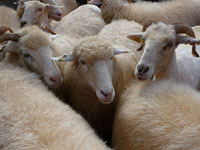Good News About Baa-d Moves in Australia
Holy Guacamole Vegemite! The Fremantle City Council just voted to phase out the live export of sheep from its port. To get an idea of how huge this decision is, consider that in 2006 more than 80 percent of the almost 4 million sheep who were exported from Australia went through Fremantle’s port.
Why the move to stop shipping sheep? Freemantle Mayor Brad Pettitt declared that it’s time for the “cruel and unnecessary live sheep trade to be phased out and replaced with a trade that supports local jobs.” Indeed, the transport to the Middle East of millions of sheep—some of whom were once used and abused for their wool—is the stuff that nightmares are made of. The grueling journey can take weeks or sometimes months, and animals battle starvation, disease, and trampling from severe crowding. Those who survive the arduous journey are then taken to slaughter and have their throats cut while they are still conscious.
Australian meat workers have spoken out. Politicians have voted to close their ports. You say that you, too, have taken action to help sheep? Post a comment to tell us all about it.
Written by Karin Bennett


